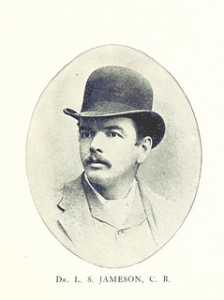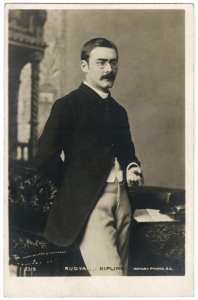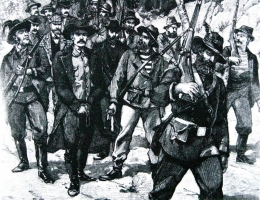 My guess is that many of you may have no idea who Leander Starr Jameson is or was. And, to be honest, I did not know much about him until recently. He was born on the 9th of February in 1853 and he died on the 26th of November in 1917. He was a British colonial politician and was best known for his involvement in what became known as the Jameson Raid.
My guess is that many of you may have no idea who Leander Starr Jameson is or was. And, to be honest, I did not know much about him until recently. He was born on the 9th of February in 1853 and he died on the 26th of November in 1917. He was a British colonial politician and was best known for his involvement in what became known as the Jameson Raid.
The Jameson Raid was a botched raid on the Transvaal Republic carried out by Leander Starr Jameson and his Company mercenaries and policemen over the New Year weekend of 1895–96. It was intended to trigger an uprising by the primarily British expatriate workers in what is present day South Africa, but it failed to do so. These expat workers were called the Johannesburg conspirators. They were expected to recruit an army and prepare for an insurrection. The raid was failed and no uprising took place.
All of this is backstory and meant to impress you with my ability to Google things faster than a speeding bullet. It is also to set the background for a man who, despite a resounding failure, seems to have inspired a degree of devotion from his contemporaries. Elizabeth Longford writes of him, “Whatever one felt about him or his projects when he was not there, one could not help falling for the man in his presence”.
 Longford also notes that Rudyard Kipling wrote the poem “If—“ with Leander Starr Jameson in mind as an inspiration for the characteristics by which he recommended young people to live. This is notably so for Kipling’s son, to whom the poem is addressed in the last lines. Direct evidence that the poem “If—“ was written about Jameson is available also in Rudyard Kipling’s autobiography in which Kipling writes that “If—“ was “drawn from Jameson’s character.” Kipling indicates that it was written in celebration of Leander Starr Jameson’s personal qualities at overcoming the difficulties of the Raid, for which he largely took the blame, although Joseph Chamberlain, British Colonial Secretary of the day, was, according to some historians, implicated in the events of the raid.
Longford also notes that Rudyard Kipling wrote the poem “If—“ with Leander Starr Jameson in mind as an inspiration for the characteristics by which he recommended young people to live. This is notably so for Kipling’s son, to whom the poem is addressed in the last lines. Direct evidence that the poem “If—“ was written about Jameson is available also in Rudyard Kipling’s autobiography in which Kipling writes that “If—“ was “drawn from Jameson’s character.” Kipling indicates that it was written in celebration of Leander Starr Jameson’s personal qualities at overcoming the difficulties of the Raid, for which he largely took the blame, although Joseph Chamberlain, British Colonial Secretary of the day, was, according to some historians, implicated in the events of the raid.
 So, what characteristics did Kipling have in mind? As noted above, in 1895, Jameson led about 500 of his countrymen in what became known as the Jameson Raid against the Boers in southern Africa. That event was later cited by Winston Churchill as a major factor in bringing about the Boer War of 1899 to 1902. But the story as recounted in Britain was quite different. The British defeat was interpreted as a victory and Jameson was portrayed as a daring hero. The poem celebrates heroism, dignity, stoicism and courage in the face of the disaster of the failed Jameson Raid, for which he was wrongfully made a scapegoat.
So, what characteristics did Kipling have in mind? As noted above, in 1895, Jameson led about 500 of his countrymen in what became known as the Jameson Raid against the Boers in southern Africa. That event was later cited by Winston Churchill as a major factor in bringing about the Boer War of 1899 to 1902. But the story as recounted in Britain was quite different. The British defeat was interpreted as a victory and Jameson was portrayed as a daring hero. The poem celebrates heroism, dignity, stoicism and courage in the face of the disaster of the failed Jameson Raid, for which he was wrongfully made a scapegoat.
Consider the words of Rudyard Kipling in the famous poem:
If you can keep your head when all about you
Are losing theirs and blaming it on you,
If you can trust yourself when all men doubt you,
But make allowance for their doubting too;
If you can wait and not be tired by waiting,
Or being lied about, don’t deal in lies,
Or being hated, don’t give way to hating,
And yet don’t look too good, nor talk too wise:
If you can dream—and not make dreams your master;
If you can think—and not make thoughts your aim;
If you can meet with Triumph and Disaster
And treat those two impostors just the same;
If you can bear to hear the truth you’ve spoken
Twisted by knaves to make a trap for fools,
Or watch the things you gave your life to, broken,
And stoop and build ’em up with worn-out tools:
If you can make one heap of all your winnings
And risk it on one turn of pitch-and-toss,
And lose, and start again at your beginnings
And never breathe a word about your loss;
If you can force your heart and nerve and sinew
To serve your turn long after they are gone,
And so hold on when there is nothing in you
Except the Will which says to them: “Hold on!”
If you can talk with crowds and keep your virtue,
Or walk with Kings—nor lose the common touch,
If neither foes nor loving friends can hurt you,
If all men count with you, but none too much;
If you can fill the unforgiving minute
With sixty seconds’ worth of distance run,
Yours is the Earth and everything that’s in it,
And—which is more—you’ll be a Man, my son!
Each of the characteristics noted in the poem are sure to be found in great leaders. They are not commonly seen much today. Are they seen in you?
Photo credit: The British Library / Foter / No known copyright restrictions
Photo credit: Foter / Public Domain Mark 1.0
Photo credit: Foter / Public domain
Photo credit: Foter / Public domain



Please note: I reserve the right to delete comments that are offensive or off-topic.